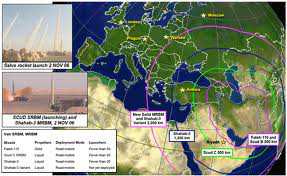|
By Billy Geibel (JTW) After the NATO meeting in Brussels this past week, which discussed plans to create a new ballistic missile defense shield, Turkey has openly acknowledged that it is weighing the benefits of a proposed NATO missile defense system within its borders, and will continue to deliberate the matter until there is a clear consensus among the decision. The proposed missile shield plan was originally developed by the United States, but the U.S. has been pushing hard for NATO to take up the plan as its own, since it would be to the benefit of all member nations. Among allegations that Turkey has been accused of being pushed into accepting this plan by the United States, and the high optimism of NATO officials, Turkey has maintained that it will analyse and deliberate on all the possible outcomes and implications of the proposed plan before it will reach a decision. “This is not a reservation, but the conditions needed for negotiation. We are negotiating the terms of it, and naturally parties are presenting their opinions,” Defense Minister Gönül told reporters Friday. Despite Turkey’s insistence that deliberation on the matter should not be viewed as reluctance or reservation, Turkey has expressed several concerns about the possibility of creating a missile defense system within the country. Turkey’s main concern is directed towards the negative reactions of its eastern neighbors, most notably Iran and Syria. The plan, as it is now, would list several countries as ‘threats’ to the missile shield, and amongst these would be Syria and Iran. Turkey is fearful that the singling out of specific states would only produce negative reactions and lead to increased instability, rather than security. To its credit, Turkey is well aware that while it must continue to search for ways to increase its own security, it must put equal emphasis on maintaining and building good relations with both Syria and Iran, as well other states within the region.
Turkish Officials address this concern for the labeling of certain countries as ‘threats’ at the meeting in Brussels. “We told the U.S. officials that Iran and Syria should not be cited as ‘threats’ for the NATO’ s planned missile shield,” a Turkish Foreign Ministry official said on Friday. In Ankara, Government Officials echoed these same concerns when they told U.S. officials, “that if defense is the purpose of the system, no nations should be named in NATO documents as targets, since that would provoke those countries.” Another concern of Turkey in regards to the NATO defense system is the impact that it could have on its own missile systems and capabilities within the country. Defense Minister Gönül reported that, “Turkey is weighing the compatibility of the proposed missile system with Turkey’s own missile capabilities.” Adding later that this new NATO missile defense system could bring significant cost reductions for Turkey in terms of missile systems. Turkey has till November 19th before it is expected to make a decision on the issue at the NATO summit in Brussels. Until that time, Turkey is expected to continue to deliberate on the many implications of both accepting and opposing this plan. Hasan Selim Ozertem a researcher at the International Strategic Research Organization, believes that Turkey should accept the new plan, but must make sure to not compromise its foreign policy agenda or its image. “Turkey has worked for a long time to rid itself of the image of being controlled by the United States and the West, and it is possible that by accepting this new plan Turkey’s image may regress back to this puppet image. Therefore, it is crucial that Turkey does not use this opportunity as a bargaining opportunity with the West and NATO. Turkey should not allow itself to be perceived as an outsider ‘protecting the West’, but rather, a member of the West, and therefore its interests should be in cohesion with Western interests.” This is a key component that Turkey must realize if it wishes to act in its best benefit. Turkey has the opportunity to force the Western States to incorporate it as an equal actor in the global world of international security. However, Agreeing to the plan does not come without possible negative consequences. As Hasan Selim Özertem, an expert on security issues in the Caucasus and Caspian regions at the USAK (International Strategic Research Organization), points out that, “by agreeing to house NATO or American Missile Shields in Turkey, Turkey is simultaneously putting itself in the middle of any sort of future conflict between the West and East.” “If any type of violent conflict was to break out in the region, Turkey will have accepted the role of being a target, regardless of their individual actions or views on the situation,” said Özertem. It is certain that Turkey is of the utmost importance in this issue, due in large part to its strategic geographic location, but it must make sure to weigh both the pros and cons of their decision. Özertem says, “It will be in Turkey’s favor to accept this plan, but only if certain conditions are met by all the members involved. NATO and the West must make sure that they are acting in the best interest of Turkey, and Turkey must make sure that NATO and America are committed to not just their own security, but to the security of Turkey as well.” Turkey seems to be aware of this valuable concept, as it has already commented that the missile shield must be large enough to protect all of Turkey. It is this awareness for its own power, and its own protection that Turkey must remember, and not credulously succumb to the pressure of the United States and the West. |
Saturday, 16 October 2010The Journal of Turkish Weekly |
